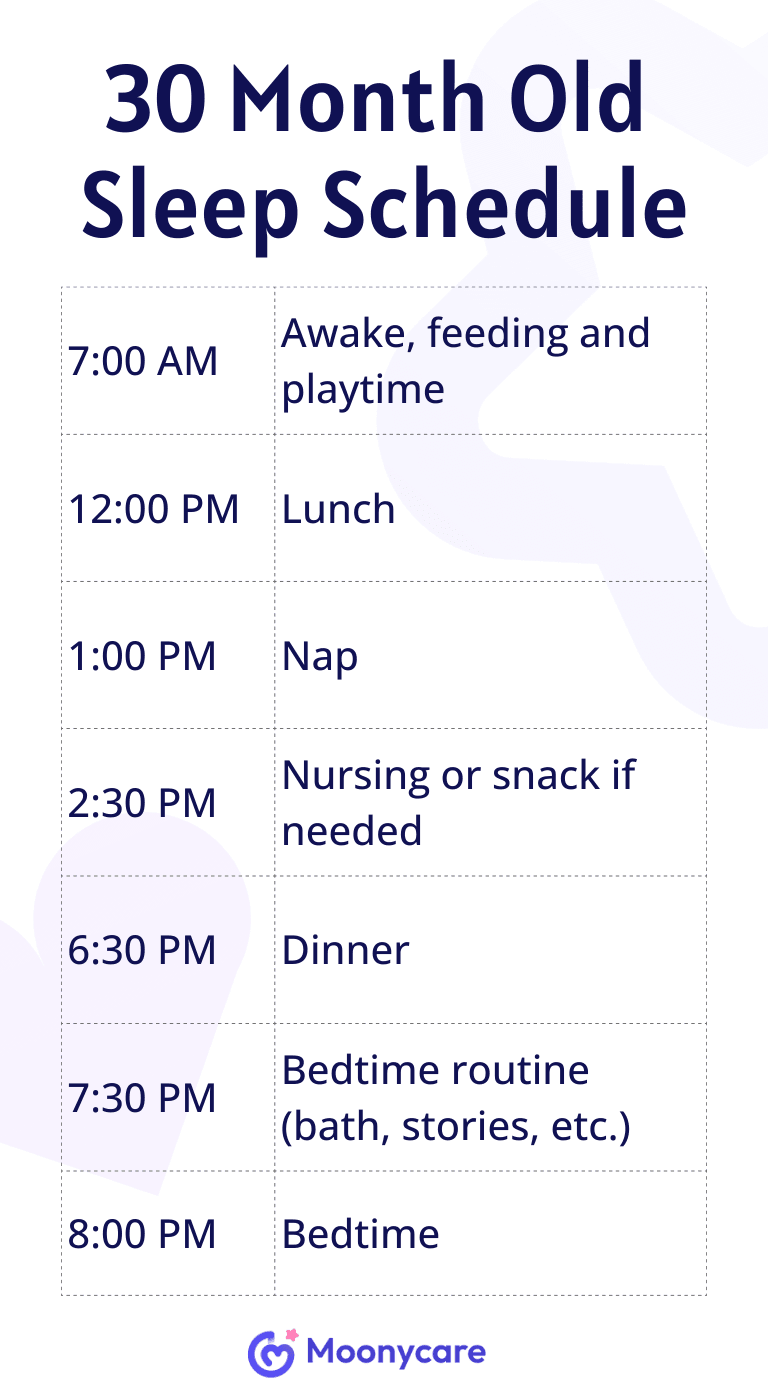

Establishing a consistent sleep routine for a 30-month-old is crucial to their development and overall well-being. At this age, your toddler is likely exploring more independence, which can sometimes make sleep routines a bit challenging. However, with the right strategies in place, you can ensure that your child gets the rest they need. This guide will help you navigate the sleep schedule for your baby, providing you with practical tips and insights to create a balanced and healthy sleep routine for your growing toddler.
To be honest, navigating a sleep schedule can be challenging, but with Moonycare app, it will provide a practical one for your baby easily, helping your baby develop healthy sleep habits. It can understand your baby's sleep needs and solve the occurring issues smoothly, achieving the restful nights and happy days both for your baby and you.
IN THIS ARTICLE:
What are Wake Windows for a 30 Month Old?
A Sample Sleep Schedule for 30 Month Old Babies
How Much Should a 30 Month Old Sleep?
How Long Should a 30 Month Old Nap?
What Should I Do If My 30-Month-Old Suddenly Refusing Naptime?
What Time Should a 30-Month-Old Go to Bed?
Can you Sleep Train a 30-Month-Old?
Is there Sleep Regression for 30 Month Old Babies?
What are Wake Windows for a 30-Month-Old?
For babies at 30 months, wake windows typically range between 4 to 6 hours. This time frame allows them to engage in activities that stimulate their mind and body, preparing them for the next sleep period. However, these wake windows can vary based on your child's individual needs and temperament. Observing their behavior, such as signs of tiredness or irritability, can help you adjust these windows accordingly.
For example:
Morning wake window: about 5-6 hours after waking up in the morning
Afternoon wake window: about 4-5 hours after ending the nap
Sample 30-Month-Old Sleep Schedule
Creating a sample sleep schedule tailored to your toddler's needs is essential for consistency. Here's a typical 30-month-old sleep schedule:

Note that it is necessary to make adjustments based on your child's specific needs.
How Much Should a 30-Month-Old Sleep?
At 30 months, baby typically requires between 12 to 14 hours of sleep each day, containing approximately 11-12 hours nighttime sleep. It is crucial to make sure that your child gets adequate sleep, which is good for their physical, emotional, and cognitive development.
How Long Should a 30-Month-Old Nap?
At this age, toddlers usually take one nap per day, lasting around 1 to 2 hours. This midday nap helps them recharge and prevents them from becoming overtired by bedtime. It's important to monitor the duration of the nap to ensure it doesn't interfere with nighttime sleep, as a nap that's too long can make it difficult for your toddler to fall asleep at night.
What Should I Do If My 30-Month-Old Suddenly Refusing Naptime?
It is common for baby to refuse nap at this age. If your 30-month-old suddenly refuses naptime, it could be due to various factors like developmental changes, separation anxiety, or overstimulation.
To address this, maintain a consistent naptime routine to provide stability. Offer a calming pre-nap ritual, such as reading a book or playing soft music, to signal that it's time to rest. Ensure the sleep environment is quiet, dark, and comfortable. If your toddler still resists, consider adjusting the nap time slightly earlier or later to align better with their natural sleep cues. Patience and consistency are key during this transition.
What Time Should a 30-Month-Old Go to Bed?
Bedtime for a 30-month-old is typically between 7:00 PM and 8:00 PM. Setting a consistent bedtime within this window helps regulate their sleep cycle and ensures they get the recommended amount of sleep. If necessary, you can establish a soothing bedtime routine before sleeping to help your toddle transition into sleep smoothly. Normally, the routine tends to include some calm activities like a bath, story time, soft music to avoid too exciting.
Sleep Train a 30-Month-Old
Sleep training at this stage focuses on reinforcing good sleep habits and ensuring your toddler can fall asleep independently. Techniques such as the "fading method", where you gradually reduce your presence in the room as your child falls asleep, can be effective. During this process, the key is to keep consistency, giving time to allow your child learn to self-soothe and build a healthy sleep routine.
Sleep Regression of a 30-Month-Old
Sleep regressions can occur at various developmental stages, including around 30 months. During this period, your toddler might resist bedtime, wake up frequently at night, or have difficulty napping. These regressions are often linked to developmental milestones, such as language acquisition or increased independence. To solve it, maintaining a consistent sleep schedule and offering reassurance during these disruptions can help your child get back on track.
30-Month-Old Sleep Tips
Here are some additional tips to help ensure your 30-month-old gets the sleep they need:
-
Be Consistency: Stick to regular sleep and wake times, even on weekends, allowing your baby foster a good habit to sleep at the same time each day.
-
Create a Calming Environment: Make your child's bedroom a peaceful place conducive to sleep, with dim lighting and a comfortable temperature.
-
Limit Screen Time: Avoid screens at least an hour before bed, as blue light can interfere with melatonin production.
-
Encourage Physical Activity: Ensure your toddler gets plenty of exercise during the day, which can help them sleep better at night.
-
Be Patient and Reassuring: Offer comfort and reassurance during nighttime awakenings or when your child is struggling with sleep.
























